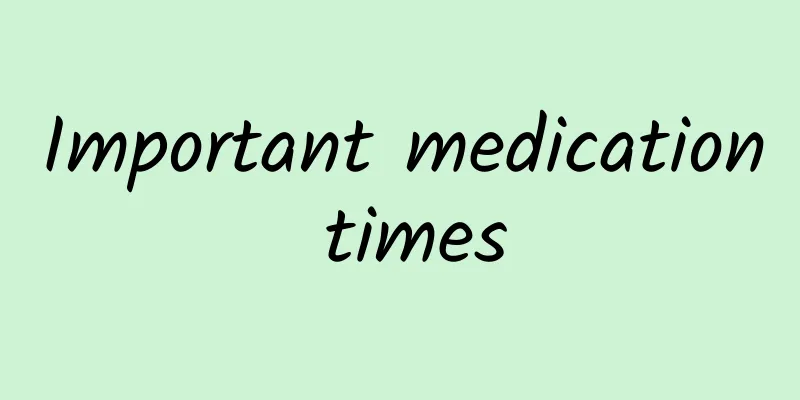Important medication times

|
When is the right time to take medicine? The efficacy of many drugs is closely related to the time of taking them. Choosing the right time to take the drugs and adapting to the changes in the human body's biological rhythms (such as circadian rhythms) can not only improve the efficacy, but also reduce the side effects of the drugs and improve medication compliance. Many parents have some questions about the time of taking medicine, such as: The doctor said that this medicine should be taken once a day. When should I take it? Morning, noon or evening? The doctor said that this medicine should be taken three times a day. Should I take the medicine first, or before eating, or take the medicine and eat at the same time? Definition of medication schedule Take on an empty stomach: generally take 1 hour before or 2 hours after a meal Take before meals: generally take 15 to 30 minutes before meals Take with food: Take with food, that is, take the medicine after a small meal, and continue to take it after finishing the meal. Take after meal: Take 15-30 minutes after meal Morning service: Take in the morning Take before bed: Take 15 to 30 minutes before bedtime Advantages and disadvantages of different medication schedules ① Take medicine in the morning: At this time, the food in the stomach and small intestine has basically disappeared after a night of digestion, which is conducive to the contact between the medicine and the stomach. The medicine can be fully absorbed by the body and take effect quickly. The disadvantage is that it has a certain irritation to the stomach. ② Take medicine on an empty stomach: At this time, there is basically no food in the stomach and small intestine, which can prevent the drug from being affected by the food in the stomach and reducing its efficacy. The disadvantage is that it will cause certain irritation to the stomach. ③ Taking medicine before meals: The advantage is that there is no food in the stomach at this time, which is conducive to the absorption of the drug in the stomach and the effect on the stomach wall. In addition, the stomach empties quickly. As the food reaches the stomach, the food quickly pushes the drug into the small intestine. The disadvantage is that the drugs that require rapid effect but are irritating to the stomach are limited to be taken before meals. ④ Taking medicine during meals: The advantage is that it can reduce irritation to the gastric mucosa, and the disadvantage is that taking medicine during meals is often unpleasant. ⑤ Taking medicine after meals: The advantages are that it reduces drug irritation to the gastrointestinal tract, hinders the diffusion of drugs to the wall of the digestive tract, delays the disintegration of drug preparations and the dissolution of drugs, and to some extent plays a certain sustained-release role. The disadvantage is that it often has a counterproductive effect on drugs that require rapid release. ⑥ Take medicine before bedtime: The advantage is that you don’t have to consider the effect of food on the medicine, but the disadvantage is that it is easy to miss a dose. Time to take common medications Drugs suitable for taking on an empty stomach: Antibacterial drugs such as amoxicillin, cefradine, and norfloxacin are easily affected by food and their efficacy is reduced. Taking them on an empty stomach can improve their bioavailability and rapid absorption. Anti-tuberculosis drugs such as rifampicin and isoniazid have the highest peak concentration and the best efficacy when taken on an empty stomach. The efficacy of taking the drugs after eating will be greatly reduced. When anthelmintics are taken on an empty stomach, the drug concentration in the intestine is higher, which is conducive to direct contact between the intestinal drugs and the worms, enhancing the efficacy. Drugs suitable for taking before meals: Enteric-coated drugs: Enteric-coated drugs have special characteristics. Taking them before meals can ensure that the drugs pass through the stomach and enter the small intestine as soon as possible, so that they are dissolved, released, and take effect. For example, enteric-coated aspirin tablets. Digestive system drugs are mostly taken before meals. Gastrointestinal motility drugs such as domperidone and mosapride can help promote gastric motility and gastric juice secretion when taken before meals. Gastric mucosal protective agents such as compound glutamine and potassium citrate can make the drugs fully adhere to the stomach wall and form a protective film on the surface of the gastric mucosa when taken before meals. Drugs suitable for taking with meals: Antifungal drugs such as itraconazole and ketoconazole can be taken with food to promote drug absorption and enhance drug efficacy, while also reducing gastrointestinal side effects of drugs. They should be taken with meals. Choleretic drugs such as ursodeoxycholic acid and liver-protecting drugs can be taken with food to better exert their efficacy and should also be taken with meals. Drugs suitable for taking after meals: Drugs that irritate the gastrointestinal tract, such as aspirin tablets (non-enteric-coated preparations) that are prone to induce ulcers, acetaminophen, oral iron preparations, anti-gout drugs, etc., need to be taken after meals. Antacids such as aluminum carbonate can neutralize stomach acid, but eating can increase stomach acid secretion, so they need to be taken after meals. Drugs suitable for taking in the morning: Glucocorticoid drugs such as dexamethasone and prednisone should be taken at 7-8 am, because the secretion of glucocorticoids changes in a circadian rhythm, and the secretion peaks at 6-8 am. Giving the total daily dose of corticosteroids at the peak can not only enhance its efficacy, but also reduce the inhibition of the body's own secretion. Thyroid-stimulating hormone drugs such as levothyroxine sodium should be taken once on an empty stomach in the morning. Diuretics such as furosemide, hydrochlorothiazide, spironolactone, etc. should be taken in the morning to avoid increased urination at night. Drugs suitable for taking before bedtime: Hypnotic drugs such as estazolam and zolpidem should be taken before bedtime. Anti-asthma drugs such as theophylline sustained-release tablets and montelukast sodium are often taken 30 minutes before bedtime because asthma patients are prone to attacks at night or in the early morning. They have better efficacy and can also play a preventive role. Anti-allergic drugs such as chlorpheniramine and cetirizine should be taken before bedtime because they can cause drowsiness. Tips for taking medicine Before taking the medicine, read the instructions carefully and arrange the time and dosage of the medicine reasonably. The time, usage and dosage of the medicine should be marked on the medicine box; use small tools such as alarm clocks to remind you to take the medicine. If you have any questions, be sure to consult a pharmacist or doctor. Source: Department of Pharmacy, Tianjin Children's Hospital Author: Pharmacist Dong Jigang Reviewer: Sun Yanyan, Chief Pharmacist Yu He, Chief Pharmacist |
<<: Information for parents of children with epilepsy
>>: Probiotics: What You Need to Know
Recommend
What are the dietary precautions after cesarean section
You must pay attention to the dietary precautions...
What should I do if there is residue after two months of medical abortion?
If you have to have an abortion, it is recommende...
What will happen if you have sex before your period is over?
We all know that when a woman is menstruating, sh...
What causes swelling in late pregnancy?
As we all know, pregnancy is a special period. Th...
What is abnormal bleeding during non-menstrual period?
Under normal circumstances, women will not bleed ...
Will less vaginal discharge affect fertility?
Some female friends may experience less vaginal d...
Why is there such a big difference in the severity of positive symptoms before and after the relaxation? An important factor has been overlooked!
Recently, there has been a heated discussion onli...
Pork in the vegetable market will be prohibited from lighting from December 1st! How does the "beautification light" interfere with our vision?
The juicy green vegetables in the vegetable marke...
The temperature is like a roller coaster when the seasons change. If you don’t want to get sick, learn these things from me
With the change of seasons, the temperature often...
Behind the death of a famous singer: What exactly is pneumothorax? Changsha Fourth Hospital explains
Recently, the news of the death of a famous singe...
Xiaomi: Xiaomi's omni-channel payment amount has exceeded 20 billion yuan in the 618 e-commerce promotion in 2024
According to recent news, during the annual 618 e...
Should women trim their pubic hair?
The question of whether women should trim their p...
How to breastfeed with inverted nipples? Try these methods!
New mothers with inverted nipples may encounter a...
Is it better to have sex in the morning or at night to get pregnant?
Many young couples actively invest in pregnancy p...









